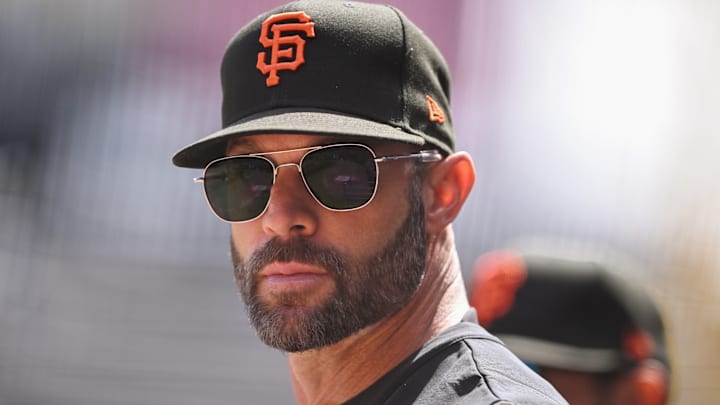The SF Giants suffered an excruciating 6-5 loss against the Kansas City Royals. It was one that simply got away, but it was manager Gabe Kapler's explanation in using Ross Stripling after the defeat that raised some level of concern.
SF Giants manager Gabe Kapler's explanation after loss reveals flaw with in-game management
Let's take a step back and recognize that this was only one game. One loss. Sure, it is early, but games in April mean just as much as they do in September. At the end of the year, teams on the outside of the playoff bubble will looks at games that they let slip away throughout the year and recognize that their record should be better.
That could be the Giants in September. If they are just outside of the playoff picture, they will recognize this as one of the key games that they should have win.
Everyone knows the game story at this point. The Giants held a comfortable 5-1 lead heading into the seventh inning. Kapler tabbed Stripling to relieve Sean Manaea, who gave the Giants six fantastic innings.
Stripling went on to allow four runs over the next 1.2 frames against the Royals. This included a game-typing, three-run shot by Salvador Pérez. Stripling was pulled after that. It bears mentioning that the Giants gave this game away on multiple fronts. They loaded the bases with no outs in the bottom of the eighth inning and did not score.
Plus, the eventual winning run scored on a wild pitch from Camilo Doval. The loss was not necessarily on Stripling alone. I think, and I want to emphasize that I am inserting my opinion here, that Stripling was not the pitcher to use with a four-run lead heading into the seventh inning.
The veteran starter had not looked good at all in his last several appearances dating back to the end of spring training. This was not the game to try and save the bullpen. I think that was a mistake in the first place. But, an even bigger mistake was allowing Stripling to face Pérez with the tying run at the plate. Stripling was not fooling anyone and that was evident to anyone watching the game.
The real question is, why was Stripling even in the game? Danny Emerman of KNBR provided Kapler's explanation on this:
Kapler said Sean Manaea is still building up to starter’s length. Plan was always to piggyback him and Ross Stripling today https://t.co/5CdYSZZHQr
— Danny Emerman (@DannyEmerman) April 8, 2023
When it comes to in-game management, I typically look at the process rather than the results. In the context of one game, a good process can yield suboptimal results. That happens. However, a good process will typically yield favorable results more often than not.
This is where Kapler will not easily shed criticisms of being too systematic at times. Like a hitter in the middle of an at-bat, a manager has to be able to make adjustments as well. For Kapler, the plan was always to piggyback Manaea with Stripling.
By the time Manaea was removed, this was no longer a piggyback game. The left-handed hurler allowed just one earned run on three hits, one walk, and eight strikeouts in six innings. I can understand Kapler's process if Manaea only gave the Giants three or four innings.
In that case, it would make sense to use Stripling to bridge the gap to the bullpen. However, this was not a piggyback game. By the time Manaea departed with a four-run lead, this became a game where Kapler needed to manage to win.
If he went with someone like Scott Alexander, who then went on to blow the game, I can understand the process because Alexander is a good leverage reliever. More often than not, he is going to come through.
Instead, he tried to preserve a relatively fresh bullpen by using Stripling because that was the plan all along. This was an objectively poor process on Kapler's part and the Giants lost the game because of it. You have to be able to adjust the plan based on the game and he just did not do that.
This is what separates the good managers from the bad managers. And, I am not saying that Kapler is one or the other. I am saying that good managers, more often than not, have a plan but adjust that as the game progresses. Hopefully, Kapler learns from this experience and becomes better because of it. And hopefully, one game does not come back to bite the Giants at the end of the year.
